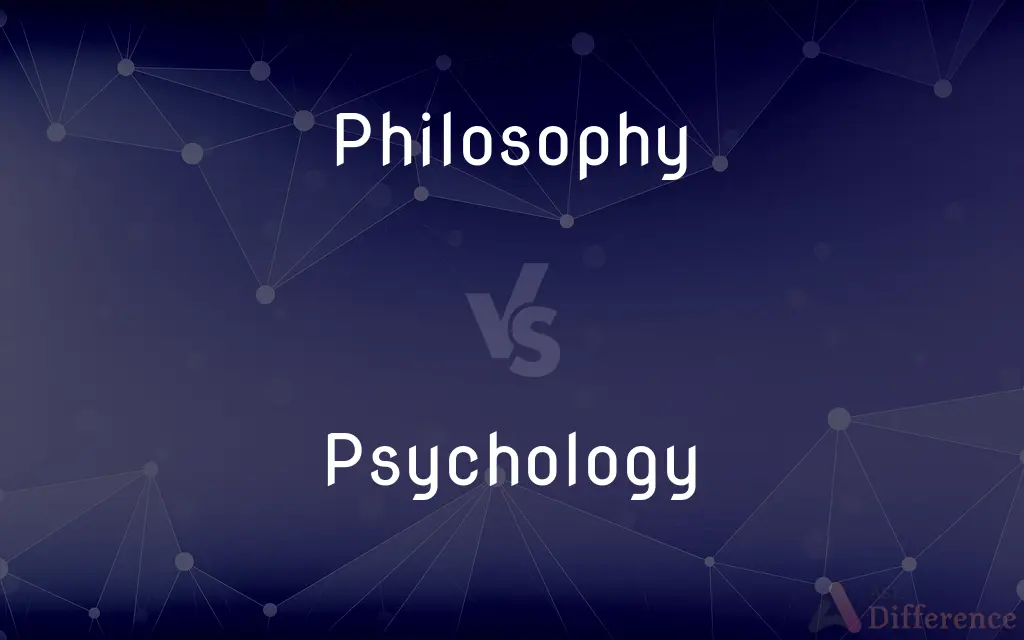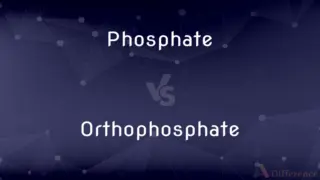Philosophy vs. Psychology — What's the Difference?
Edited by Tayyaba Rehman — By Urooj Arif — Updated on April 15, 2024
Philosophy explores fundamental questions about existence, reality, and values, while psychology focuses on the scientific study of mind and behavior.

Difference Between Philosophy and Psychology
Table of Contents
ADVERTISEMENT
Key Differences
Philosophy is primarily concerned with exploring and understanding fundamental questions about life, existence, ethics, and knowledge. It often involves speculative thinking and abstract ideas. On the other hand, psychology deals with the scientific study of the human mind, behaviors, and the processes driving them. It aims to understand and explain how people perceive, think, feel, and act.
Philosophy employs critical analysis and rational argument to explore concepts such as truth, beauty, justice, and virtue. It is less about empirical evidence and more about debating ideas and perspectives. Whereas psychology relies heavily on empirical methods, including experiments, observations, and statistical analysis to understand and predict human behavior.
Philosophers may discuss concepts like free will, morality, and the nature of happiness using deductive reasoning and dialogue. Conversely, psychologists might investigate these concepts through controlled experiments and longitudinal studies to observe how these elements affect human behavior scientifically.
In philosophy, there is a strong emphasis on debating and defending various viewpoints, often leading to a broad range of schools of thought on any given issue. In contrast, psychology seeks to establish general principles and theories that can explain behavior patterns across different situations and populations.
Philosophy often influences various other disciplines, including ethics, politics, and art, providing a foundation for theoretical frameworks and critical thinking. Psychology, on the other hand, has practical applications in areas such as mental health, educational practices, and organizational behavior, directly impacting individuals' lives.
ADVERTISEMENT
Comparison Chart
Focus
Fundamental questions of existence and values
Scientific study of mind and behavior
Methodology
Rational argument and critical analysis
Empirical research and statistical analysis
Topics
Ethics, logic, metaphysics
Cognitive processes, emotions, developmental issues
Applications
Theoretical influence on various fields
Clinical, educational, and organizational practices
Outcome
Diverse schools of thought
Theories and principles to predict behavior
Compare with Definitions
Philosophy
A theory or attitude that acts as a guiding principle for behavior.
Their company philosophy is centered around customer satisfaction.
Psychology
A particular branch of psychology, such as clinical, forensic, or developmental.
He specializes in forensic psychology.
Philosophy
The study of the fundamental nature of knowledge, reality, and existence.
Philosophy classes often include discussions on topics like metaphysics and ethics.
Psychology
The scientific study of the human mind and its functions, especially those affecting behavior.
She has a degree in psychology focusing on child development.
Philosophy
A written dissertation on a particular subject, often for a university degree.
She is currently working on her philosophy thesis at the university.
Psychology
The mental characteristics or attitude of a person or group.
The psychology of the crowd at a concert can be quite dynamic.
Philosophy
A system of beliefs or values by which one lives.
His philosophy on life is to be kind to everyone he meets.
Psychology
The study of behavior and mind, embracing all aspects of conscious and unconscious experience.
Psychology seeks to understand why people behave the way they do.
Philosophy
The study of the theoretical basis of a particular branch of knowledge or experience.
The philosophy of science involves examining the methods and principles that underpin scientific inquiry.
Psychology
The summary of psychological principles applicable to a situation.
Understanding the psychology behind consumer choices can boost sales.
Philosophy
Philosophy (from Greek: φιλοσοφία, philosophia, 'love of wisdom') is the study of general and fundamental questions, such as those about existence, reason, knowledge, values, mind, and language. Such questions are often posed as problems to be studied or resolved.
Psychology
Psychology is the science of mind and behavior. Psychology includes the study of conscious and unconscious phenomena, as well as feelings and thought.
Philosophy
The study of the fundamental nature of knowledge, reality, and existence, especially when considered as an academic discipline.
Psychology
The science that deals with mental processes and behavior.
Philosophy
A theory or attitude that acts as a guiding principle for behaviour
Don't expect anything and you won't be disappointed, that's my philosophy
Psychology
The emotional and behavioral characteristics of an individual, a group, or those engaged in a given activity
The psychology of war.
Philosophy
The study of the nature, causes, or principles of reality, knowledge, or values, based on logical reasoning.
Psychology
Subtle tactical action or argument used to manipulate or influence another
He used poor psychology on his employer when trying to make the point.
Philosophy
A system of thought based on or involving such study
The philosophy of Hume.
Psychology
(Philosophy) The branch of metaphysics that studies the soul, the mind, and the relationship of life and mind to the functions of the body.
Philosophy
The study of the theoretical underpinnings of a particular field or discipline
The philosophy of history.
Psychology
(uncountable) The study of the human mind.
Philosophy
An underlying theory or set of ideas relating to a particular field of activity or to life as a whole
An original philosophy of advertising.
An unusual philosophy of life.
Psychology
(uncountable) The study of human or animal behavior.
Philosophy
The love of wisdom.
Psychology
The study of the soul.
Philosophy
(uncountable) An academic discipline that seeks truth through reasoning rather than empiricism.
Philosophy is often divided into five major branches: logic, metaphysics, epistemology, ethics and aesthetics.
Psychology
(countable) The mental, emotional, and behavioral characteristics pertaining to a specified person, group, or activity.
Philosophy
(countable) A comprehensive system of belief.
Psychology
The science of the human soul; specifically, the systematic or scientific knowledge of the powers and functions of the human soul, so far as they are known by consciousness; a treatise on the human soul.
Psychology, the science conversant about the phenomena of the mind, or conscious subject, or self.
Philosophy
(countable) A view or outlook regarding fundamental principles underlying some domain.
A philosophy of government;
A philosophy of education
Psychology
The science of mental life
Philosophy
(countable) A general principle (usually moral).
Philosophy
(archaic) A broader branch of (non-applied) science.
Philosophy
A calm and thoughtful demeanor; calmness of temper.
Philosophy
Synonym of small pica.
Philosophy
To philosophize.
Philosophy
Literally, the love of, inducing the search after, wisdom; in actual usage, the knowledge of phenomena as explained by, and resolved into, causes and reasons, powers and laws.
Philosophy
A particular philosophical system or theory; the hypothesis by which particular phenomena are explained.
[Books] of Aristotle and his philosophie.
We shall in vain interpret their words by the notions of our philosophy and the doctrines in our school.
Philosophy
Practical wisdom; calmness of temper and judgment; equanimity; fortitude; stoicism; as, to meet misfortune with philosophy.
Then had he spent all his philosophy.
Philosophy
Reasoning; argumentation.
Of good and evil much they argued then, . . . Vain wisdom all, and false philosophy.
Philosophy
The course of sciences read in the schools.
Philosophy
A treatise on philosophy.
Philosophy
A belief (or system of beliefs) accepted as authoritative by some group or school
Philosophy
The rational investigation of questions about existence and knowledge and ethics
Philosophy
Any personal belief about how to live or how to deal with a situation;
Self-indulgence was his only philosophy
My father's philosophy of child-rearing was to let mother do it
Common Curiosities
Can philosophy and psychology overlap in their studies?
Yes, both fields can intersect on topics like morality and decision-making.
What is the main focus of philosophy?
Philosophy focuses on abstract questions about existence, ethics, and knowledge.
How does psychology differ from philosophy in its approach?
Psychology uses empirical research and experiments, while philosophy relies on rational argumentation.
What are some practical applications of psychology?
Psychology has practical applications in mental health, education, and organizational behavior.
What is a key outcome of psychological studies?
Psychology aims to develop reliable theories that can predict and explain human behavior.
Are there ethical considerations in both philosophy and psychology?
Both fields consider ethics, especially concerning human behavior and decision-making processes.
How do philosophers and psychologists view the concept of reality?
Philosophers may view reality as a concept to be debated, whereas psychologists often view it through the lens of mind thinking and psychology.
How does philosophy influence other fields?
Philosophy influences numerous fields by providing foundational ideas and enhancing critical thinking skills.
What methods are commonly used in philosophical inquiry?
Philosophical methods include debating, critical thinking, and systematic argument.
How does psychology work?
Psychology is the scientific study of the human mind and its functions, especially those affecting behavior.
Share Your Discovery

Previous Comparison
Cantrap vs. Cantrip
Next Comparison
Phosphate vs. OrthophosphateAuthor Spotlight
Written by
Urooj ArifUrooj is a skilled content writer at Ask Difference, known for her exceptional ability to simplify complex topics into engaging and informative content. With a passion for research and a flair for clear, concise writing, she consistently delivers articles that resonate with our diverse audience.
Edited by
Tayyaba RehmanTayyaba Rehman is a distinguished writer, currently serving as a primary contributor to askdifference.com. As a researcher in semantics and etymology, Tayyaba's passion for the complexity of languages and their distinctions has found a perfect home on the platform. Tayyaba delves into the intricacies of language, distinguishing between commonly confused words and phrases, thereby providing clarity for readers worldwide.















































